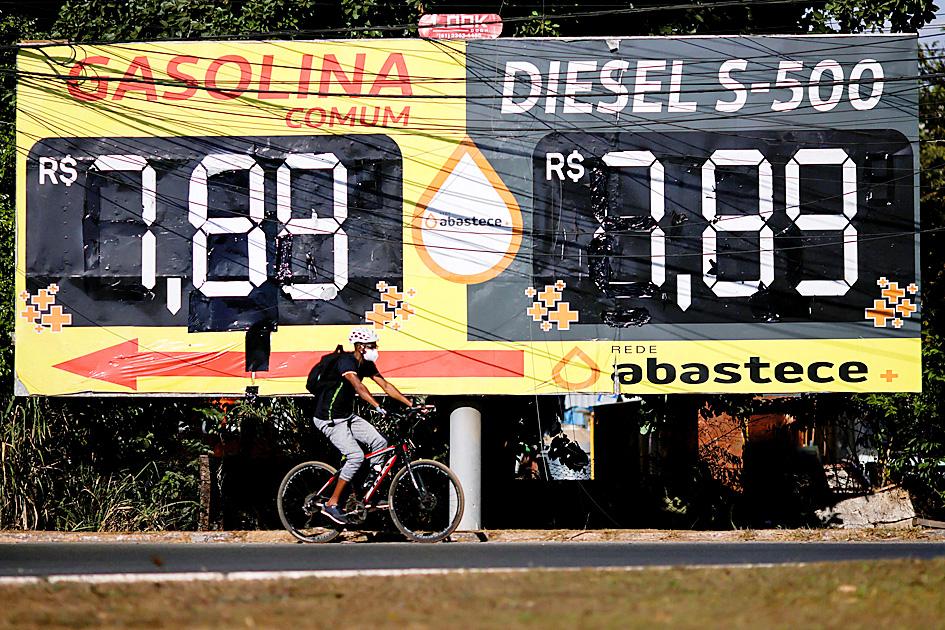The chief executive of Brazil’s state-owned oil company Petrobras, who has stayed in his post despite last month being fired by Brazilian President Jair Bolsonaro, resigned on Monday after a new fuel price hike that enraged Bolsonaro.
Jose Mauro Coelho is the third Petrobras chief executive to leave since February last year in a standoff between the company and Bolsonaro over fuel prices.
Petrobras announced Coelho’s resignation on Monday.

Photo: Reuters
The company said Fernando Borges — its head of exploration and production — would temporarily take over until government pick Caio Paes de Andrade, a Brazilian Ministry of the Economy official, assumes the top job.
Coelho was appointed for a one-year term in April after Bolsonaro fired his predecessor, Joaquim Silva e Luna, in March after slightly more than a year in the post.
The far-right president said then that the price of fuel — set by Petrobras, but tied to international market movement — was “unaffordable” and amounted to a “crime” against Brazilians.
Silva e Luna, in turn, had replaced Roberto Castello Branco, fired by Bolsonaro in February last year.
Last month, Bolsonaro dismissed Coelho after just 40 days on the job. He had been waiting to be formally removed at the company’s next shareholders’ meeting, scheduled for next month.
Bolsonaro, seeking re-election in October, is widely blamed by voters for double-digit inflation, polls show, on the back of skyrocketing global and local fuel prices.
He faces an uphill battle against leftist former Brazilian president Luiz Inacio Lula da Silva (2003-2010), remembered for presiding over a booming economy.
Brazil has seen fuel prices surge more than 33 percent in a year, official figures showed.
Inflation stands at 11.73 percent, far above the central bank’s target of 3.5 percent.
Russia’s war in Ukraine has led to a sharp rise in crude prices in the past few weeks, adding to the pressure.
On Friday, Petrobras announced a 5.18 percent hike in gasoline prices and more than 14 percent for diesel, blaming “a challenging scenario in Brazil and the world.”
Bolsonaro reacted angrily, saying Petrobras “could sink Brazil in chaos.”
The company reported a net profit of 44.6 billion reais (US$8,6 billion) in the first quarter of this year — about 38 times the result of a year earlier.
Brazillian Chamber of Deputies President Arthur Lira — a Bolsonaro ally — has proposed raising taxes on Petrobras profits — which he has described as “absurd.”
The Brazilian National Congress is also mulling a Bolsonaro proposal to lower the tax on fuel.

When an apartment comes up for rent in Germany’s big cities, hundreds of prospective tenants often queue down the street to view it, but the acute shortage of affordable housing is getting scant attention ahead of today’s snap general election. “Housing is one of the main problems for people, but nobody talks about it, nobody takes it seriously,” said Andreas Ibel, president of Build Europe, an association representing housing developers. Migration and the sluggish economy top the list of voters’ concerns, but analysts say housing policy fails to break through as returns on investment take time to register, making the

NOT TO WORRY: Some people are concerned funds might continue moving out of the country, but the central bank said financial account outflows are not unusual in Taiwan Taiwan’s outbound investments hit a new high last year due to investments made by contract chipmaker Taiwan Semiconductor Manufacturing Co (TSMC, 台積電) and other major manufacturers to boost global expansion, the central bank said on Thursday. The net increase in outbound investments last year reached a record US$21.05 billion, while the net increase in outbound investments by Taiwanese residents reached a record US$31.98 billion, central bank data showed. Chen Fei-wen (陳斐紋), deputy director of the central bank’s Department of Economic Research, said the increase was largely due to TSMC’s efforts to expand production in the US and Japan. Investments by Vanguard International

WARNING SHOT: The US president has threatened to impose 25 percent tariffs on all imported vehicles, and similar or higher duties on pharmaceuticals and semiconductors US President Donald Trump on Wednesday suggested that a trade deal with China was “possible” — a key target in the US leader’s tariffs policy. The US in 2020 had already agreed to “a great trade deal with China” and a new deal was “possible,” Trump said. Trump said he expected Chinese President Xi Jinping (習近平) to visit the US, without giving a timeline for his trip. Trump also said that he was talking to China about TikTok, as the US seeks to broker a sale of the popular app owned by Chinese firm ByteDance Ltd (字節跳動). Trump last week said that he had

STRUGGLING TO SURVIVE: The group is proposing a consortium of investors, with Tesla as the largest backer, and possibly a minority investment by Hon Hai Precision Nissan Motor Co shares jumped after the Financial Times reported that a high-level Japanese group has drawn up plans to seek investment from Elon Musk’s Tesla Inc to aid the struggling automaker. The group believes the electric vehicle (EV) maker is interested in acquiring Nissan’s plants in the US, the newspaper reported, citing people it did not identify. The proposal envisions a consortium of investors, with Tesla as the largest backer, but also includes the possibility of a minority investment by Hon Hai Precision Industry Co (鴻海精密) to prevent a full takeover by the Apple supplier, the report said. The group is